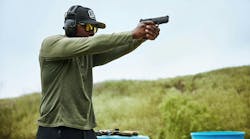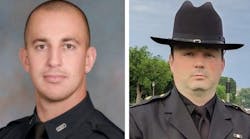Richard Porter, 17, said he's seen Chicago police officers stop and frisk so many people in his neighborhood that when a squad car rolls up, he and his friends automatically "assume the position."
Martrell Harris, 16, said his only encounter with the police included an officer questioning him on the street, blowing cigarette smoke in his face and then letting him go on his way.
Dionna Rice, 17, lamented that even girls have to deal with random police stops. "If you say, 'What's the problem?' it's like they get offended," Rice said. "If you ask them why you're being stopped, they get mad. They have total power over you."
On a recent morning, these juniors at Hyde Park Academy met in the school's broadcast studio, not far from the gym where President Barack Obama visited in February to talk about Chicago's gun violence. The students are among a group of teens creating a short documentary on their experiences with the police.
For a city desperately trying to cut its homicide rate, one of the biggest challenges has been getting residents living in Chicago's high-crime areas to cooperate with law enforcement. While some residents fear reprisals from the bad guys, many others say negative run-ins with the police have created a culture of distrust.
As a result, no matter how embattled a community becomes, some residents bristle at the idea of police deploying more officers to their neighborhood. Even the latest plan by police to increase foot patrols in 20 high-crime zones caused concern among residents who like the idea but fear it may only mean more law-abiding youths will be arrested.
Bridging a divide complicated by racial conflict and years of police corruption may be especially important in a city where last year only 1 in 4 of its just over 500 homicides were solved, according to Chicago Police Department statistics.
Superintendent Garry McCarthy said the department recognizes the problem and is trying to recover from a breakdown in police-community relations and a series of abuse cases by rogue cops from now-disbanded special units.
"We abandoned community policing to drive down crime and there was unintended harm that occurred there," he said. "We earned a lack of trust, and some of it is historical."
McCarthy said the department is working on improving police training and is also implementing a campaign using celebrities in advertisements that try to persuade witnesses that the "no-snitch" culture works against their interests, as does taking matters into their own hands by retaliating.
"If you are a victim or witness to a crime, you can save a life by helping us. That's the message we're trying to translate," McCarthy said. "We are also doing the largest ... police legitimacy training in the country. It's a part of changing the culture of how we do business."
Experts say such training teaches officers how to gain respect in troubled communities, which helps them be seen by residents as legitimate authority figures.
Young people are one of the largest groups the police have to win over, said Mariame Kaba, founder and director of the Chicago-based Project NIA, which along with First Defense Legal Aid put together a report examining juvenile arrests in Chicago in 2009 and 2010.
According to "Arresting Justice," there were about 27,500 juvenile arrests in Chicago in 2010. Although Police Department statistics show that people younger than 17 make up a minority of the city's homicide victims and offenders -- in fact, most of their crimes are nonviolent -- Kaba said teens and young adults tend to interact more with beat cops.
"(Young people) are the ones hanging out on the corners or in front of their homes," Kaba said. "Older people get targeted too, but they tend to move through communities in different ways.
"I'd love for folks to understand just what negative interactions young black boys are having on a daily basis with police. This is not without consequence. The rage they feel is real."
David Kennedy is director of the Center for Crime Prevention and Control at the John Jay College of Criminal Justice in New York. He has been working with the Chicago Police Department to reduce homicides since the summer of 2010.
Flooding a community with new beat officers who stop more residents may not be the best approach, he said. Because lethal violence is driven by a small group of people with lengthy criminal records, police may be more effective when they zero in on the people who have been violent and who might be violent.
"Police officers think they need to make contact with as many people as possible so they are more likely to get to the bad guys," Kennedy said. "But what that means is that nearly everyone they make contact with is not (one of) the bad guys and they wind up having lots of contact with young men who feel abused, disrespected and alienated."
He said that if the police work to identify the 1 or 2 percent of 18- to 26-year-old males in the "hottest" neighborhoods who are committing the homicides, two things happen.
"You stop having damaging contact with the people who aren't committing crimes," Kennedy said. "And you let the community know you can tell the difference between the guys engaged in violence and the rest of the community."
Jean Carter-Hill agrees. The director of a community center in the embattled Englewood neighborhood, Carter-Hill said she likes the Police Department's plan to increase the number of beat cops who patrol her neighborhood on foot because it can help build relationships between the police and residents.
"That used to be part of the (community policing) process," she said. "The police would come to the block club meetings. They dropped into organizations. We had their cell numbers. But that relationship is not here now, and even with the police walking the streets, it will take a while to rebuild."
Carter-Hill said that until then, she will continue to mediate conflicts between the young men who visit her center rather than call the police. She said once when she got officers involved to settle a feud between two teenage boys, she immediately regretted dialing 911.
"They came in here, patting the boys down," she said. "I didn't like the way they talked to the kids and treated them. When I called the police, I thought I'd get someone to work with the kids and their families. These kids are already angry. They'll say the wrong thing and get locked up."
She said that when teens enter the criminal justice system, it's difficult for them to get out.
"It's got to be very serious for me to call the police on a child," she said.
One Chicago police officer, who asked not to be identified because he didn't want to get into trouble with his superiors, said he understands why some people are reluctant to call the police. But, he said, officers have a difficult job to do.
"We're dealing with dangerous criminals," he said. "When you do identify them, how do you prevent them from committing a crime? You can't stop them every second or you're violating their civil rights. As far as keeping track of their movements, that's virtually impossible, too."
He said he was a beat cop for more than a decade in Englewood and believes there are legitimate reasons for stopping and frisking people, and respectful ways to do it.
"You're trying to serve and protect, but you're also trying to be safe and you want to go home to your family," he said. "That's the main goal at the end of everyone's shift."
Another South Side patrolman who's been on the job for more than two decades and spoke on condition of anonymity said that while some officers can be heavy-handed, he has encountered residents who treated him with hostility without provocation, including a shooting victim who refused to cooperate with police and insisted on driving himself to the hospital.
"Everyone has a strong opinion of police officers," he said. "I can't sit down and analyze every person I come in contact with, but I understand how they may feel."
He said children are usually friendly early on, but there's a turning point in adolescence when youths stop trusting the police.
"I think it stems from word of mouth from their friends," he said. "Their friends tell them, 'Don't speak to the police,' or they had a negative encounter with the police. Older members of their family may have a dislike for police and pass that on to them."
Jamie Kalven is a writer with the nonprofit Invisible Institute, which has been working with the Hyde Park Academy students on the documentary. It is part of a larger project Kalven has undertaken to help improve relationships between residents and the police.
"The paradox of inner-city policing is that it's either too little or too much," Kalven said. "These youth see the police as either being absent, or they're sweeping in with militarylike force."
Kalven worked for 12 years in the former Stateway Gardens housing project as an advocate for residents, some of whom were involved in police abuse cases. He said one of the problems in crime hot spots is that rogue police officers are rarely held accountable when they cross the line.
On a recent morning at the high school, Kalven asked the students to re-enact what happens during a routine traffic stop. Four male students rearranged their chairs to simulate riding in a car and another student played the role of a police officer.
The encounter included the "officer" belittling the passengers, trying to pit one against the others and stealing money. It also included the "driver" asking questions about the stop but measuring his words and body language so that the encounter didn't escalate.
"You have to be careful because almost anything you do or say can provoke (the officers) and make them feel disrespected," Hassanti Vernon, 17, said when the role-play was over.
Travell Jackson, 17, said many of the students just want to be safe, and they want the police to do their jobs. "They're supposed to serve and protect," he said. "But sometimes the police act just like another gang."
Kalven said it takes only a few abusive officers acting with impunity to alienate an entire neighborhood. The abuse, he said, has a powerful impact on the choices young people make.
"Every interaction, no matter how minor, really matters," he said. "It leaves a mark, a residue. The challenge is to get these young men who want to resist to do so not as outlaws, but in ways that allow them to have allies."
Copyright 2013 - Chicago Tribune
McClatchy-Tribune News Service


